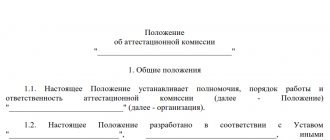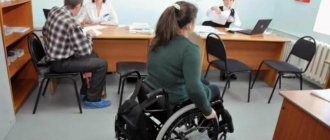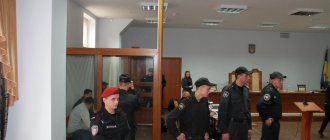What is ITU
Before the ratification of Federal Law No. 181 in 1995, issues of conducting research on people with serious illnesses were dealt with by a special board, which is commonly called VTEC. After the designated period, all the functions assigned to the VTEC were transferred to the Committee for Medical and Social Expertise.
Both names of organizations are still used in everyday life, but the official organization authorized to conduct examinations of citizens who apply is the Medical and Social Commission. The newly formed organization expediently replaced VTEK in the system of work on social relations.
And if the VTE commission dealt with issues of persons who have lost their ability to work, then MSEC is authorized to work with disabled children who have not entered their working years. The expert council also takes action against people with congenital defects or disabilities acquired at a very early age and classified as “disabled children”.
Main functions of the Federal Bureau of Medical and Social Expertise
- Control of the work of ITU institutions of the Russian Federation, including control of the work of the Main Bureaus: carrying out, on their own initiative, repeated examinations of citizens who have been examined at the Main Bureau, and, if there are grounds, changing or canceling the decisions of the Main Bureau;
- Examination of citizens in the direction of expert teams of the main bureaus in cases requiring the use of particularly complex special types of examination or an advisory opinion from the Federal Bureau;
- Implementation of comprehensive expert rehabilitation diagnostics using the latest technologies and results of scientific developments in order to determine the presence of disabilities, the degree of loss of professional ability, rehabilitation potential and the need for social protection measures;
- Submitting proposals to the Federal Medical and Biological Agency on the formation of a state order for carrying out research and development work on medical and social examination;
- Conducting scientific research on behalf of the Federal Medical and Biological Agency, in particular, studying factors leading to disability. Submitting proposals to the Federal Medical and Biological Agency on the implementation of scientific developments, new technologies for expert rehabilitation diagnostics, best practices of the main bureaus, as well as the implementation of programs in various areas of medical and social expertise;
- Participation in the development and implementation of programs on disability and people with disabilities;
- Organization of professional training, retraining and advanced training of specialists in the field of medical and social examination;
- Methodological and organizational assistance to the main bureau;
- Ensuring uniform application of the legislation of the Russian Federation in the field of social protection of disabled people in the established field of activity;
- Statistical observation and statistical assessment of the state of disability, observation of the demographic composition of disabled people in the Russian Federation.
Actions of a person with a disease to obtain disability
Mandatory actions on the part of the candidate to assign a category of incapacity are:
The medical commission is initiated by the attending physician by issuing a referral to specialists. The list of doctors whom the initiator of the study of his condition needs to visit is appointed by the attending physician in accordance with the disease that the candidate for the disability category suffers from. A health examination may be ordered by the Pension Fund depending on the case of disability assignment.
Persons who have obvious signs of disability and persistent limitations in the processes of independent life are sent to MSE. At the same time, they need state social protection. The work of the medical council can be repeated when working with an unhealthy person in the event of a recommission appointed due to the end of time.
Referrals for examination are divided according to the following criteria:
- In the presence of an obvious unfavorable labor prognosis and clinical picture of the disease, regardless of the duration of temporary disability, but not more than four months.
- With a picture of a favorable labor outcome against the background of a duration of disability of up to 10 months. In this category, the issue of establishing a disability group or conducting treatment in the future is decided.
- For employed disabled people in case of worsening clinical prognosis or working conditions. At the same time, VTEK is authorized to make changes to labor recommendations.
For reference! A referral for an MSEC examination must be endorsed by the head of the institution and signed by three specialists from the same medical institution with mandatory certification with the stamp and seal of the organization.
VTEC is now called ITU
01.08.2007 17:28
A little more than three months have passed since the well-known organization VTEK, now renamed ITU, was headed by a new leader - Mairbek Sulumbekovich Khasiev. The other day our correspondent talked with him. Below are questions and answers from participants in this dialogue.
— Mairbek Sulumbekovich, tell us a little about yourself.
— I was born in Grozny in 1963. After graduating from high school, in 1981 he entered SOGMI (North Ossetian State Medical Institute), from which he graduated in 1987. Studied at the medical department. After being assigned, he worked as a doctor in various hospitals in our republic. Before his appointment to his current position, he worked at the Achkhoy-Martan district hospital.
Since March 27, 2007, he headed the Federal State Institution “Main Bureau of Medical and Social Expertise in the Chechen Republic.”
— As far as I know, not so long ago VTEC, the institution you head, was renamed ITU. What is the reason for this, and how have its functions changed?
— The work of the ITU is to examine patients referred to us by primary health care facilities (treatment and preventive institutions). The main thing in our work is to establish the disability group and the degree of loss of ability to work, as well as to carry out rehabilitation actions to return the disabled person to the ranks of healthy people. ITU works in close contact with the Ministry of Health and the Ministry of Labor and Social Development, as well as the Social Insurance Fund and the prosthetic and orthopedic enterprise and the Pension Fund of the Republic.
I consider my main task to be reducing disability through an objective approach to determining disability. From the very beginning of my work, I set a task that includes the following sections:
1. Improving the quality of examination.
2. In controversial cases, resolving the issue in favor of the patient. Provide the most positive solution possible.
3. All employees must treat patients with care.
— During the period when ITU was called VTEC, the most incredible rumors circulated about it. What will be done to increase the ITU's prestige?
— From the first days of my work, I was asked to set a schedule for receiving citizens. This proposal, of course, was aimed at improving our work, but I decided to make some adjustments. I wanted to receive citizens at any time of the working week. People really liked it. In this they saw openness, trust, and self-respect.
Let me have more work, as long as the visitors remain happy. If you count the people who have visited me since I started working, there will be about 4 thousand of them. They come to me with different questions and I try to satisfy them all. There are cases when a person is unfairly deprived of a disability group. This cannot be allowed. And I'm trying to establish justice. I have not had a single case where a patient left upset or dissatisfied. After a thorough explanation, the visitor is not offended even if a disability is denied. Anyone who is entitled to a disability will definitely receive it. It is our duty to give it fairly. I am doing everything in my power to knock down or eliminate the negativity that has accumulated in the past in relation to our service.
— I would like to know what the situation is with the number of disabled people. According to media reports, we have the highest growth in this figure. Is it so?
— Yes, we have the highest number of disabled people out of all the regions of Russia. There are many objective reasons for this that are known to a more or less literate person. Let me remind you of some: military operations that continued after 1994 with some breaks of about 10 years, unfavorable social conditions, etc. As a result, as of June 14, 2007, the number of disabled people in the Chechen Republic was 77,525. Of these, 13,270 are disabled people of group I, 34,123 of group II, 5,193 of group III.
Scientific studies conducted by UN specialists and other international organizations have shown that disability among the population increases after military conflicts. The downward trend begins only 10 years later. This was the case after the 1st and 2nd world wars.
— Undoubtedly, the team that you lead has problems. Tell us about them, please.
- Yes, they exist, and there are many of them. I will name a few main ones. It is very difficult due to the lack of an appropriate building. It’s cramped even in the existing 13 rooms. Our ITU in the republic has 10 branches and two main bureaus, plus auxiliary units. For full accommodation, with the necessary working conditions, our employees require at least 30-35 premises.
For the population of our republic, which numbers about 1,200,000 people, it is necessary to have 15 branches and 3 main bureaus. According to the standards, 1 branch (expert staff) must serve 70-80 thousand people. But in fact, one branch serves from 16 to 27 thousand people, with a norm of 5-7 thousand examined. The lack of transport remains an unresolved issue. It is necessary to serve patients at home and in the districts.
However, we do not lose hope that our situation will improve. Recently, a meeting with Deputy Prime Minister L. Magomadov provided an opportunity to tell the republic’s leadership about our problems. Magomadov promised to do everything possible to improve working conditions.
The Federal Agency for Health and Social Development, represented by the deputy head of this agency, A. Belikov, also announced assistance in resolving complex issues.
— Mairbek Sulumbekovich, what would you like to say at the end of our conversation?
— In conclusion, I would like to say that while I am at the head of the ITU, all patients who deserve disability will receive it. And we will fire employees involved in extortion immediately. As the popular saying goes, “the chickens are counted in the fall,” so I would like the results of my activities to be reported at the end of the year. And then, I hope: patients will be convinced that MSE is not at all like the old VTEC.
Khabibula Eskerkhanov “News of the Republic” No. 107, July 31, 2007
What documents are needed
The list of documents that should be provided to the medical college at the time of the start of its work is usually widely available on the information stand. It must be remembered that in order to speed up the receipt of the MSEC certificate, the package of documents must be complete and correctly executed.
Required documents include:
Registration of disability for a child
- civil document of the person being examined;
- outpatient study card;
- a final certificate drawn up based on the results of the medical examination;
- current results of prescribed tests;
- all diagnostic procedures performed that are related to the disease with a description of their results;
- for an adult working person - a work book, production characteristics according to the established model;
- upon receipt of disability as a result of an accident at the enterprise - act N-1;
- application from the patient to conduct an expert health study.
Submission of documents is carried out by the patient independently, or if it is impossible to perform these actions in person, a power of attorney is drawn up for the representative, entrusting him with the authority to conduct work with the ITU. The power of attorney must be notarized.
Attention! If an applicant for registration of a disability group is refused a referral at the clinic, he has the right to request an F6 form, independently go through specialists, collect the necessary certificates and submit an application to the VTEK with a request for his examination.
Main functions of the Bureau of Medical and Social Expertise
- Establishing the facts of disability among examined citizens, groups, causes, timing and time of onset of disability;
- Determination of the degree of loss of professional ability to work (in percentage);
- Development and correction of an individual rehabilitation program for a disabled person (IPR), including the determination of types, forms, timing and volumes of rehabilitation measures (which include medical, social and professional rehabilitation);
- Determining the need for medical, social and professional rehabilitation of victims of industrial accidents and occupational diseases;
- Development and correction of rehabilitation programs for disabled people and victims of industrial accidents and occupational diseases;
- Determining the cause of death of disabled people in cases where the legislation of the Russian Federation provides for the provision of social support measures to the family of the deceased;
- Registration of citizens living in the serviced territory who have passed a medical and social examination; state statistical observation of the demographic composition of disabled people living in the service territory;
- Development of programs for the prevention of disability and social protection of disabled people;
- Explaining to citizens undergoing examination the issues arising in connection with the medical and social examination.
How does the commission work?
The date of the examination is set in advance on the day the application is submitted. The initiator comes to the institution and undergoes an expert examination. Since all medical and diagnostic measures have been carried out previously, the experts, based on these documents, conduct a conversation consisting of questions from doctors, a psychologist and a social service specialist. In some cases, a visual examination of an incapacitated person is permitted.
At the end of the conversation between the specialists and the candidate, the latter leaves the site of the medical examination, and the members of the medical commission begin to condemn the patient’s state of affairs
The decision is made by voting. According to the law, specialists are given a maximum of six days to receive a final verdict.
The decision obtained by the adoption of a majority of opinions is sent to the patient by mail to the address specified in the application or, possibly, notification by telephone. The candidate must be issued a certificate of his examination, and upon establishing the category of disability, a certificate from MSEC in the approved form.
In case of an unreasonable refusal, a citizen has the right to appeal to a higher authority, which is the ITU Regional Bureau. If you are dissatisfied with this organization, you can contact the Federal Office of MSEC. You can also protect your interests in court proceedings.
The resulting extract from the examination report is transferred by the disabled person to the pension fund, where assignments are made for the rehabilitation of his condition, recommended by the examination and mandatory for implementation. A person with disabilities is also provided with appropriate benefits to receive free treatment or other privileges.
Features of passing the ITU for certain groups of people
The program for undergoing expert examination is almost the same for all patients. But there are features that depend on the specific age of the patient or the individuality of the existing disease.
| Patient category | Individual characteristics of the event |
| Minors | The Children's Disability Commission insists on admitting children only with their parents (guardian). The documents must be accompanied by a certificate confirming where the child is studying and a personal reference from the place of study. |
| People of retirement age categories | A certificate from the Pension Fund about the amount of the pension and the availability of additional benefits is required |
| Persons who have had a heart attack or cancer patients | Persons with such diagnoses receive a referral for MSE after four months of incapacity for work. |
| Patients with visual problems | A referral for a medical examination is issued not by a local doctor, but by an ophthalmologist |
| A seriously ill person who is not allowed to be transported to the meeting place of the MSEC | All the necessary papers are prepared by the doctors of the department where the incapacitated person resides. Submitted for examination with a special certificate confirming the impossibility of personal presence |
| A person is undergoing inpatient treatment in a psychiatric hospital | To carry out the procedure, the authorized person must have a power of attorney, which is drawn up in the psychiatric department with the participation of a notary. In critical situations, assurance from the head physician of the hospital is sufficient. |
Are there differences between ITU and VTEC
ITU is a structure that performs the tasks of VTEC, but has a wider range of actions in relation to the age category of citizens. The decoding of the abbreviation VTEC means that this is an expert commission on medical labor activity . She considered only disability issues in relation to working citizens. It was carried out only for the adult population of the country.
Its main task was to determine a person’s capabilities for full-time work , whether there is a need to transfer a citizen to work with a light regime, or whether he is completely disabled. Not only the state of health was considered, but also the working conditions provided at the place of work.
The medical and social examination currently being carried out began to function in 1995. It applies to both adults and children and does not depend on the performance of work.
Tips for successfully passing VTEK
Since the decision at the MSEC is made collectively and depends on the opinion of the members of the medical commission during a visual examination of a person with disabilities and a personal conversation with him, then when undergoing a visual examination you should know how to behave and adhere to the following standards of behavior:
- The patient's helplessness must correspond to the established diagnosis. You should not exaggerate the degree of your illness, since the full picture of the course of the disease is visible to specialists from the provided papers.
- The patient should not demonstrate a clear interest in assigning a disability group just to receive material benefits.
- Adequacy of behavior with members of the commission without familiarity and ingratiation during the inspection.
- A patient’s attractive appearance always has a positive effect on the opinion of doctors.
- Demonstrating an interest in recovery. Have a conversation about what plans a healthy person can implement.
What questions are asked at the medical council?
To obtain a complete picture of the patient’s medical history, the board conducts a thorough examination by identifying the patient’s response to society in answers to the questions asked.
A person with limited capabilities is interested in a positive outcome of the examination, so it is better to be prepared for a conversation with experts and know what to say
The following common survey options exist:
- The conversation is based on issues related to the patient’s health, so the patient should know the name of his illness and the course of treatment. If possible, the candidate should know the name of the medications he is taking to improve his condition and what procedures he has used to positively develop healthy skills;
- the patient’s social position in society, that is, his work activity, academic success, whether there is a social life;
- personal questions, medical in nature and related to an intimate nature. Open answers will help to create a complete profile of the patient;
- with the maximum loss of ability to self-sufficiency, MSEC finds out information about the person who will care for the incapacitated person;
- to draw up an IPRA, which can be expanded by investing their own funds for treatment, members of the VTEK study the degree of financial situation of the disabled person;
- In order to draw up recommendatory measures sent to city authorities to increase the comfort of a wheelchair user, a conversation may arise about whether the municipal commission to inspect the living quarters of a disabled person conducted studies of living conditions in accordance with the Housing Code of the Russian Federation.
A person with disabilities should imagine how VTEC meetings take place, since the success of registering his disability depends on this, which sometimes depends on the subjective opinion of experts. If you prepare for the standard surveys described and have all the necessary papers available, your chance of success increases significantly.









